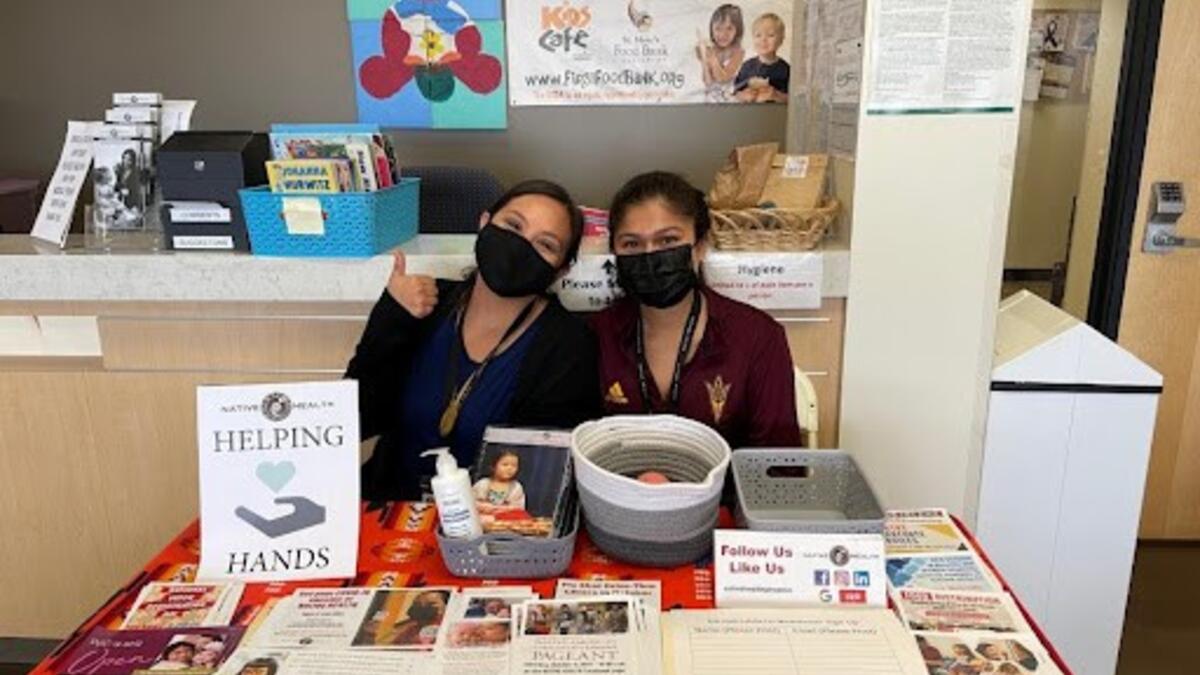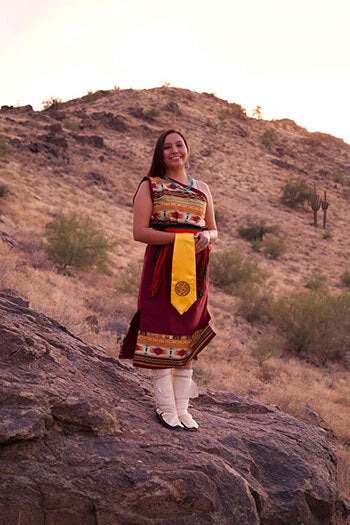Grad sets sights on improving Indigenous health

Ashley Brock (left) and a co-intern share information about the Helping Hands program at Native Health in Phoenix. Photo courtesy of Ashley Brock
Editor's note: This story is part of a series of profiles of notable fall 2021 graduates.
Maybe because her parents were first responders on the reservation where she grew up in Tuba City, Arizona, or maybe because Indigenous peoples are disproportionately affected by disease and illness, Ashley Brock used to think sickness was just a part of everyday life.
“It wasn’t until I was older that I realized how difficult it is for Indigenous peoples to stay healthy in this modern, American world,” said Brock, a member of both the Navajo and Hopi Nations.
That realization led her to pursue a degree in the science of health care delivery, with a minor in American Indian studies, at Arizona State University.
“I initially started school wanting to improve health care delivery on the reservation, through process engineering and designing new clinics,” Brock said. “This is still a goal of mine; however, my goals have since expanded.”
What Brock learned during her time as a student in the College of Health Solutions’ Science of Health Care Delivery program widened the scope of opportunities she saw for improving Indigenous health. Now, in addition to contributing to improvements in process engineering, she wants to address social determinants of health in Indigenous communities.
On her short list: Start a medical technical institute with a culturally appropriate curriculum on the Navajo reservation; build and restore recreation centers to improve physical health; and create partnerships and promote idea-sharing among like-minded people to take on other insecurities experienced by Indigenous communities, such as housing, employment and food insecurity.
“I know many of my goals may not be accomplished by myself; however, if I can empower others to build on my vision, I know the health and wellness of Indigenous peoples will continue to prosper for generations to come, and this is all I ever hope for,” Brock said.
A recipient of funding from the Office of Navajo Nation Scholarship and Financial Assistance and an American Indian Services Scholarship, Brock was selected to represent the College of Health Solutions in the first cohort of students interning at the newly developed Helping Hands program at Native Health in Phoenix.
The program connects clients with a broad range of social determinants to health services in the Valley. As part of the first cohort of student interns, Brock helped to establish the procedures and processes that have made it a success.
“I admit, I have experienced days that were difficult in this internship,” Brock said. “There were days I’d wish there was more that I could do for our clients. Sometimes, I’d wish there were more hours in the day to help them. The good that comes out of those days is that it puts us in a position to think outside the box and come up with solutions. … I can’t wait to see where this program goes in the future because I believe it can make such a great impact in the community.”

Ashley Brock
Question: What was your “aha” moment, when you realized you wanted to major in the science of health care delivery?
Answer: I enrolled in the science of health care delivery program with hopes to manage and improve efficiency in Indian health service facilities. Every semester, every class and every assignment I’ve had from then on, I knew I was on the right path. This degree program has shown me the many facets of health care and has opened many doors for me, expanding my aspirations further than I ever thought they’d go. In a sense, my “aha” moment was a continuous experience since my very first semester at ASU.
Q: What’s something you learned while at ASU — in the classroom or otherwise — that surprised you or changed your perspective?
A: Every class I’ve taken has contributed, in some way, to my perspective today. I think the most impactful classes were “American Indian Sovereignty/Courts,” “Tribal Community Planning,” “Process Engineering,” “Public Health” and “Transforming Health Care.” I believe the lessons from these five classes really helped shape the way I view health and health care in Indigenous communities. To summarize, these five classes have collectively challenged my views on health care improvement and community development, from the perspective of cultural importance and decolonization.
Q: Why did you choose ASU?
A: As an Arizona native, of course ASU was my first choice in higher education. Attending an undoubtedly great university in my home state was an easy choice to make.
Q: Which professor taught you the most important lesson while at ASU?
A: I’ve worked with Dr. Elizabeth Kizer for a year, starting from her “Process Engineering” class — a class which awoke my passion for process engineering. Since then, she’s given me the opportunity to further develop and refine my skills and pursue my goals through two undergraduate research projects and the Helping Hands internship. Her guidance has been invaluable to me in my final year here at ASU.
Q: What’s the best piece of advice you’d give to those still in school?
A: Get sunshine, network, take part in school functions, talk to your professors and advisers, and mental health matters — don’t hesitate to seek help.
Q: What was your favorite spot on campus, whether for studying, meeting friends or just thinking about life?
A: The American Indian Student Support Services’ downtown office and Noble Library were my main spots for studying, depending on which campus I was on for the day. Outdoor common areas were therapeutic on those warm, sunny days.
Q: What are your plans after graduation?
A: My list of goals is so expansive. I want to open and operate a medical training institute on the Navajo reservation. I want to be a process engineer and/or a compliance officer in an Indian Health Service facility. I want to open and run fitness/recreational centers in rural reservation towns. I want to run or work for a meaningful nonprofit I believe in. I’d even want to go back to school, to work on becoming a primary care physician. There is so much more that I’d want to do. I don’t know what paths I’ll end up on, but as long as I’m helping the community and motivating others to take action in some way, I’ll be happy.
Q: If someone gave you $40 million to solve one problem on our planet, what would you tackle?
A: I’m a health care delivery student with the heart of an environmentalist. I’d want to invest in safe, renewable energy or some innovative environmental cleanup effort. Take care of Earth, so she can take care of us.
More Health and medicine

Putting health first: ASU experts doing research that improves lives and gets results
Arizona State University isn’t just studying the topic of health. It’s applying what is taught and learned to make a real…

New research indicates effects of PTSD on body vary by culture
According to the World Health Organization, about 3.9% of the world's population has had post-traumatic stress disorder at some…

Human-centered technology embraced at ASU Digital Health Summit
Digital health technology is advancing at lightning speed, but the innovation requires a human touch to ensure that everyone…